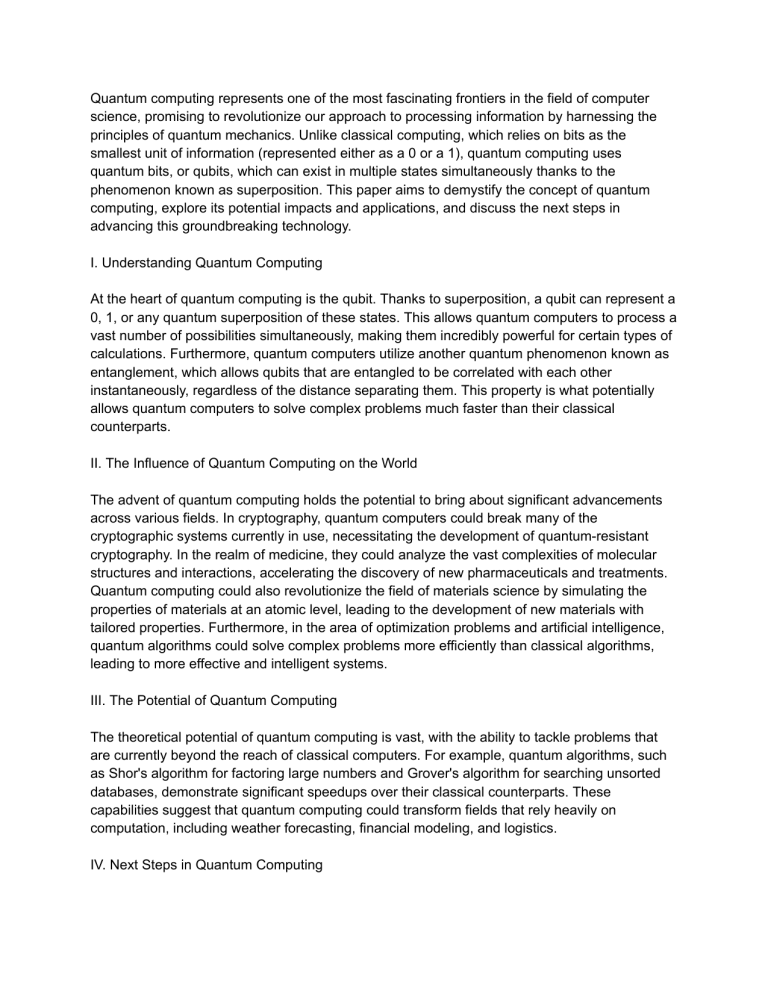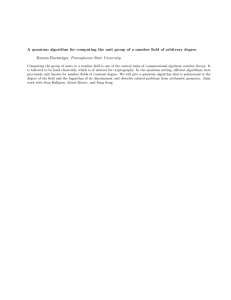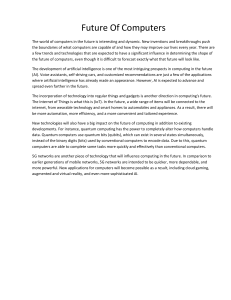
Quantum computing represents one of the most fascinating frontiers in the field of computer science, promising to revolutionize our approach to processing information by harnessing the principles of quantum mechanics. Unlike classical computing, which relies on bits as the smallest unit of information (represented either as a 0 or a 1), quantum computing uses quantum bits, or qubits, which can exist in multiple states simultaneously thanks to the phenomenon known as superposition. This paper aims to demystify the concept of quantum computing, explore its potential impacts and applications, and discuss the next steps in advancing this groundbreaking technology. I. Understanding Quantum Computing At the heart of quantum computing is the qubit. Thanks to superposition, a qubit can represent a 0, 1, or any quantum superposition of these states. This allows quantum computers to process a vast number of possibilities simultaneously, making them incredibly powerful for certain types of calculations. Furthermore, quantum computers utilize another quantum phenomenon known as entanglement, which allows qubits that are entangled to be correlated with each other instantaneously, regardless of the distance separating them. This property is what potentially allows quantum computers to solve complex problems much faster than their classical counterparts. II. The Influence of Quantum Computing on the World The advent of quantum computing holds the potential to bring about significant advancements across various fields. In cryptography, quantum computers could break many of the cryptographic systems currently in use, necessitating the development of quantum-resistant cryptography. In the realm of medicine, they could analyze the vast complexities of molecular structures and interactions, accelerating the discovery of new pharmaceuticals and treatments. Quantum computing could also revolutionize the field of materials science by simulating the properties of materials at an atomic level, leading to the development of new materials with tailored properties. Furthermore, in the area of optimization problems and artificial intelligence, quantum algorithms could solve complex problems more efficiently than classical algorithms, leading to more effective and intelligent systems. III. The Potential of Quantum Computing The theoretical potential of quantum computing is vast, with the ability to tackle problems that are currently beyond the reach of classical computers. For example, quantum algorithms, such as Shor's algorithm for factoring large numbers and Grover's algorithm for searching unsorted databases, demonstrate significant speedups over their classical counterparts. These capabilities suggest that quantum computing could transform fields that rely heavily on computation, including weather forecasting, financial modeling, and logistics. IV. Next Steps in Quantum Computing Despite its promise, the field of quantum computing faces significant technical challenges. Qubits are extremely sensitive to their environment, and maintaining their coherence (quantum state) long enough to perform calculations requires isolating them from external disturbances—a challenge known as decoherence. As such, much of the current research is focused on developing error correction techniques and creating more stable qubits. Furthermore, scaling up quantum computers to have enough qubits to be practically useful is another significant hurdle. Current quantum computers have a relatively small number of qubits, and increasing this number without exacerbating error rates is a complex challenge. Another area of focus is the development of quantum algorithms that can outperform classical algorithms in practical applications. While there are some known quantum algorithms with proven advantages, finding new algorithms that can leverage the unique properties of quantum computing is an ongoing area of research. Conclusion Quantum computing stands at the confluence of quantum mechanics, computer science, and information theory, offering a radically new approach to computation. Its potential to solve complex problems more efficiently than classical computing could lead to significant advancements across multiple fields. However, realizing this potential requires overcoming substantial technical challenges, including improving qubit stability, developing effective error correction techniques, and discovering new quantum algorithms. As researchers and technologists continue to push the boundaries of what is possible, the next steps in quantum computing will likely involve a combination of theoretical breakthroughs, technological advancements, and practical applications, paving the way for this exciting technology to fulfill its transformative potential.




